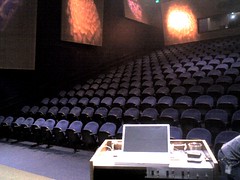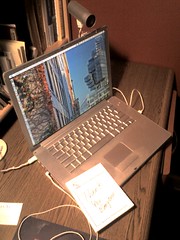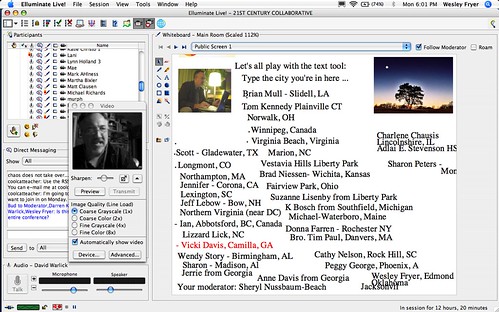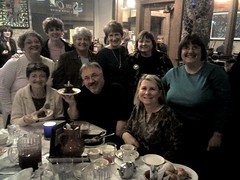 I woke up at 3:30 this morning. It’s not uncommon when I’m delivering a keynote address that day. It’s partly nervousness. It’s possible that this morning had more to do with the chocolate cake that I ordered last night, resting on a trio of chocolaty truffle’s. Allow me to pause for just a moment over that sweet memory!
I woke up at 3:30 this morning. It’s not uncommon when I’m delivering a keynote address that day. It’s partly nervousness. It’s possible that this morning had more to do with the chocolate cake that I ordered last night, resting on a trio of chocolaty truffle’s. Allow me to pause for just a moment over that sweet memory!
🙂
I’m certain though, that it had more to do with the fury that I woke up with, when it finally dawned on me what the librarians I had dinner with last night told me. They are laying off librarians in Michigan, and BUYING LAPTOPS!
Josephine Kirkbride is the one and only librarian for her school district. Maybe it’s that I come from a state with laws that mandate a professional librarian (graduate degree) in every school that makes this seem so outrageous to me. But you’ve heard me say it before. It’s not the technology, it’s the information. It’s not the laptop skills, it’s the information skills. Angus King, the former governor of Maine will tell you, “You don’t put laptops in children’s hands to improve test scores. ” There are better reasons. Yet Michigan is starting its 1:1 initiative with their 100 lowest performing school districts. Research after research after research shows that professional librarians correlate with higher student achievement (see below).
I would rather see the state invest in its future buy putting a professional librarian in each library than buy laptops for every child. They desperately need both. I could even make a case for getting rid of the library’s. But not the librarians!
Our students need to learn to teach themselves, not how to be taught. ..and this requires that they become skilled information artisans, able to effectively and responsibly access, use, and express new ideas and build new knowledge within the context of their history, their environment, their society and future. Anything less, is just preparing them for the 1950s.
- Lance: The role of the librarian correlates with student achievement (1993)
- Krashen: Higher reading scores for students with professional librarians (1993)
- International Association for the Evaluation of Educational Attainment: Pupils in schools with a professional librarian attain higher reading scores (1992)
- Philadelphia / Offenberg and Clark: Library Power results in higher SAT-9 scores in reading
Gniewek, Debra. “School Library Programs and Student Achievement: A Review of the Research.” Library Programs and Services. 12 Aug 2001. School District of Philadelphia. 26 Oct 2006 <http://libraries.phila.k12.pa.us/misc/research-sum.html>.
technorati tags:warlick, conference, mame06, mame33
Blogged with Flock

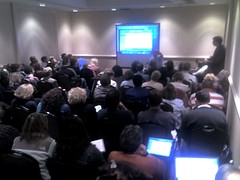
 I’m sitting in my hotel room, getting ready for the
I’m sitting in my hotel room, getting ready for the  Brenda and I are rolling down the rails on the Silver Star, bound for New York City, where I’ll be speaking at the
Brenda and I are rolling down the rails on the Silver Star, bound for New York City, where I’ll be speaking at the 
